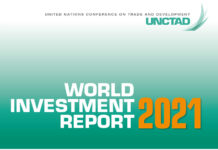The COVID-19 impact on trade in services
While the lockdowns imposed in countries across the world in the wake of COVID-19 will be lifted eventually, social distancing (both voluntary and selective) is likely to stay for longer. This has already had, and will continue to have, a significantly adverse impact on services transactions that require proximity between buyers and sellers. Moving forward, the world could see more regulatory restrictions on services trade on health grounds. This column argues that consequently, trade in services is likely to take longer to recover, with knock-on effects on other sectors of economic activity.
SERVICES TRADE ACCOUNTS FOR A QUARTER OF GLOBAL TRADE IN GOODS AND SERVICES
In gross terms, services trade accounts for a quarter of global trade in goods and services; the share of services in total trade doubles if we include trade in value added terms (WTO, 2019). This emanates from the growing “servicification” (National Board of Trade, 2012) of economic activity in countries across the world, both developing and OECD.
Services trade was shown to be more resilient to the 2008 Global Crisis than merchandise trade (Borchert and Mattoo 2009, Ariu 2016) given its low sensitivity to demand shocks and less dependence on supply finance. While COVID-19 has resulted in an immediate supply shock followed by a demand shock, what will matter more this time around will be the social distancing and contagion-related fears. These will have a bearing on services transactions which require some form of physical proximity between buyers and sellers, and which cannot be substituted or replaced by services traded over the internet.
Some services sectors are going to get more severely affected and are also likely to take longer to recover. These include education, travel, tourism and associated hotels, and restaurant services as well as air passenger transport services; transport and distribution services which are related to merchandise trade; and construction and other business services that require the movement of skilled and unskilled professionals across borders. In contrast, the effects of the pandemic on insurance, financial, telecoms, and computer-related services are likely to be more limited.
Given the importance of services in general, countries would do well to ensure that restrictions, while necessary in these times, do not become prohibitive. This would be a crucial determinant of economic recovery in the aftermath of this pandemic.
Dr. Anirudh Shingal
Anirudh Shingal is a Senior Fellow at the Indian Council for Research on International Economic Relations (ICRIER), New Delhi; a Programme Associate of the Global Governance Programme at the European University Institute (EUI), Florence and a Fellow of the World Trade Institute (WTI), University of Bern. He has also been a Jean Monnet Fellow at the EUI and a Senior Research Fellow and Lecturer in Economics at the WTI.

Discover our other contributors HERE
Source/ Image Credit: VOX CEPR Policy Portal





